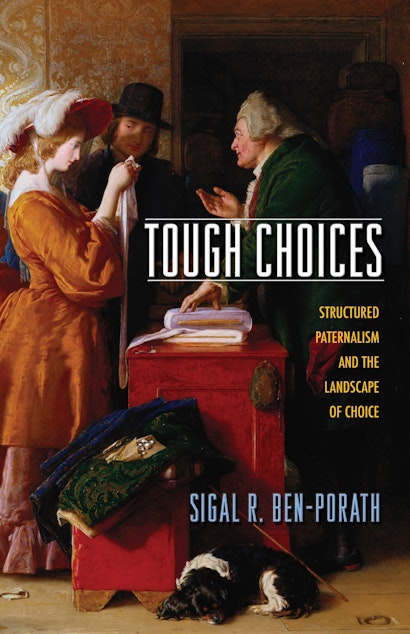To what extent should government be permitted to intervene in personal choices? In grappling with this question, liberal theory seeks to balance individual liberty with the advancement of collective goals such as equality. Too often, however, society’s obligation to provide meaningful opportunities is overshadowed by its commitment to personal freedom. Tough Choices charts a middle course between freedom-oriented anti-interventionism and equality-oriented social welfare, presenting a way to structure choices that equalize opportunities while protecting the freedom of individuals to choose among them.
Drawing on insights from behavioral economics, psychology, and educational theory, Sigal Ben-Porath makes the case for structured paternalism, which is based on the understanding that state intervention is often inevitable, and that therefore theorists and policymakers must focus on the extent to which it can productively be applied, as well as on the forms it should take in different social domains. Ben-Porath explores how structured paternalism can play a role in providing equal opportunities for individual choice in an array of personal and social contexts, including the intimate lives of adults, parent-child relationships, school choice, and intercultural relations.
Tough Choices demonstrates how structured paternalism can inform more egalitarian social policies, ones that acknowledge personal, social, and cultural differences as well as the challenges all individuals may face when they make a choice.
Sigal R. Ben-Porath is assistant professor at the Graduate School of Education and special assistant to the president at the University of Pennsylvania. She is the author of Citizenship under Fire: Democratic Education in Times of Conflict (Princeton).
"This is an important and ambitious book. It is important because it challenges head on, and in a serious, non-polemical but engaging and lively way, the widely held view that politics should fundamentally be concerned with the protection and promotion of individual freedom of choice. It is ambitious because its 180 pages not only present a distinctive theoretical framework for thinking about the relation between state regulation and individual choice but also illustrate that framework by applying it to a range of topics, many of which have been the subject of extensive scholarly debate."—Adam Swift, Theory and Research in Education
"Sigal Ben-Porath's thought-provoking book Tough Choices, advances a thoughtful and systematic defense of structured paternalism in several domains, including the regulation of intimacy, the treatment of children, the treatment of members of minority cultural groups, and school choice. . . . Ben-Porath's structured paternalism is devoid of much of what critics find alarming about paternalism and offers novel solutions to pressing issues facing policymakers."—Jennifer M. Morton, Educational Theory
"Tough Choices is a marvelously tough-minded, humane, and elegantly written essay on the value of choice in the politics of free societies. Ben-Porath has fresh, sober, and compelling things to say about a topic that is commonly shrouded in a fog of ideological folly. This is a rare thing: a wise and useful book about one of our most fundamental public values."—Eamonn Callan, Stanford University
"Tough Choices is a really excellent, pioneering work. Covering a wide range of topics, it carves out a position that challenges the orthodox antipaternalistic tendencies in contemporary liberal political theory and beyond. This book is a pleasure to read."—Harry Brighouse, University of Wisconsin-Madison
"A lively book that engages pressing public policy concerns and makes original contributions to political theory. Ben-Porath argues for an interesting and distinctive position: that the insights from behavioral economics and psychology illuminate a path toward a liberal defense of paternalism which, rather than constraining liberty, actually enhances opportunity and expands horizons of choice. This is a fine book that will attract attention within and outside of liberal political theory."—Rob Reich, Stanford University

